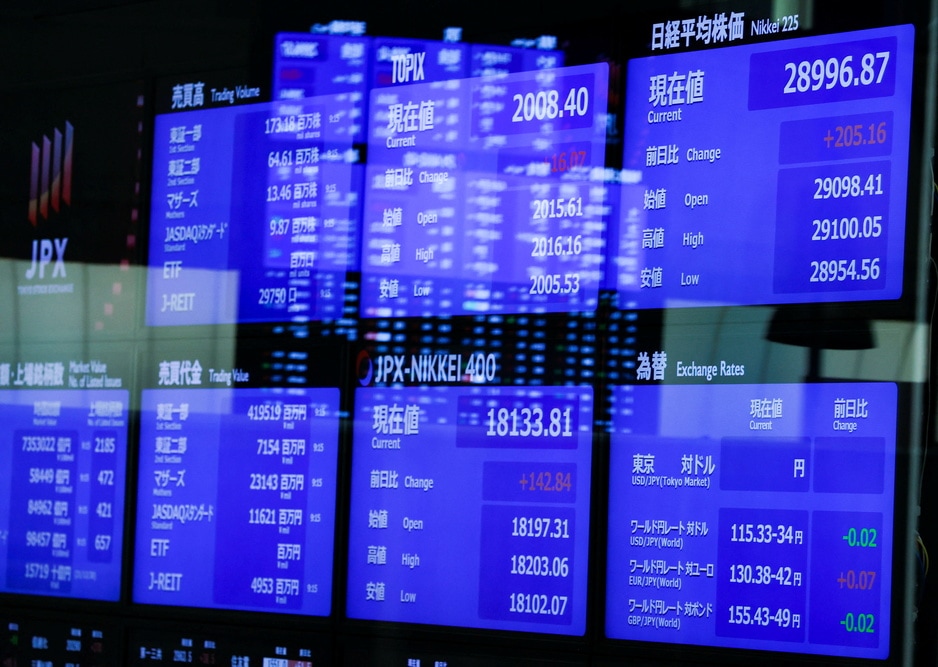Stocks fell Wednesday as mixed corporate earnings, China’s Covid struggles and the prospect of aggressive Federal Reserve monetary tightening all pointed to a deteriorating economic outlook.
MSCI Inc.’s Asia-Pacific share gauge dropped to the lowest since mid-2020, sapped by Japan, while bourses in China and Hong Kong fluctuated. U.S. equity futures stabilized after the S&P 500 slid to a six-week low and the technology-heavy Nasdaq 100 plumbed levels last seen in 2021.
The risk aversion supported the dollar, which was around the highest level in nearly two years. Treasuries pared a sharp rally from Tuesday but the benchmark 10-year yield, at 2.73%, remains lower for the week.
The euro touched the weakest level versus the greenback since 2017 amid worries that Moscow may choke gas flows to Europe, hurting the region’s growth in the ongoing fallout from Russia’s invasion of Ukraine.
Russia will cut off supplies to Poland and Bulgaria on Wednesday, making good on a threat to halt flows to countries that refuse to pay for the fuel in rubles. Oil climbed past $102 a barrel amid the escalating tension, with Europe looking at curbing Russian barrels.
The energy brinkmanship and disappointment over earnings from the likes of Alphabet Inc. and Texas Instruments Inc. sowed further doubts about the outlook for markets. The mood was already fragile due to Fed tightening to quell runaway inflation and slowing activity in China as Covid lockdowns bite.
“We know that sentiment is in a terrible state right now,” Lori Calvasina, head of U.S. equity strategy at RBC Capital Markets LLC, said on Bloomberg Television. “This is a market that’s very, very confused. There’s just a real lack of conviction in anything people want to buy at this moment in time.”
Gains in Microsoft Corp. in late trading on better-than-expected results alleviated some of the gloom.
In China, officials said they would step up infrastructure construction after a meeting Tuesday chaired by President Xi Jinping. The announcement is the latest pledge of economic support.
Elsewhere, Australia’s dollar rallied after core inflation breached the top of the central bank’s 2%-3% target for the first time since 2010. Swaps traders fully priced in a 15-basis-point hike for next month’s policy meeting.
- ech earnings include Meta Platforms, Amazon, Apple
- EIA oil inventory report, Wednesday
- Australia CPI, Wednesday
- Bank of Japan monetary policy decision, Thursday
- U.S. 1Q GDP, weekly jobless claims, Thursday
- ECB publishes its economic bulletin, Thursday
Some of the main moves in markets:
Stocks
- S&P 500 futures rose 0.3% as of 10:50 a.m. in Tokyo. The S&P 500 fell 2.8%
- Nasdaq 100 futures were steady. The Nasdaq 100 fell 3.9%
- Japan’s Topix index dropped 1.2%
- South Korea’s Kospi index fell 1.3%
- Australia’s S&P/ASX 200 index shed 0.8%
- Hong Kong’s Hang Seng index was 0.4% lower
- China’s Shanghai Composite index rose 0.2%
- Euro Stoxx 50 futures declined 0.5%
Currencies
- The Bloomberg Dollar Spot Index was little changed
- The euro was at $1.0643
- The Japanese yen was at 127.55 per dollar
- The offshore yuan was at 6.5800 per dollar
Bonds
- The yield on 10-year Treasuries rose about one basis point to 2.73%
- Australia’s 10-year bond yield declined five basis points to 3.06%
Commodities
- West Texas Intermediate crude rose 1% to $102.72 a barrel
- Gold was at $1,903.33 an ounce

